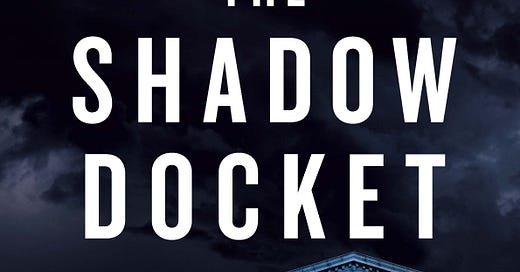Bonus 80: "The Shadow Docket" at One
With Justices Kavanaugh and Thomas recently giving voice to one of the book's central arguments, a look back at how things have changed in the year since publication—and how they haven't.
Welcome back to the weekly bonus content for “One First.” Although Monday’s regular newsletter will remain free for as long as I’m able to do this, much of the bonus content is behind a paywall as an added incentive for those who are willing and able to support the work that goes into putting this newsletter together every week. I’m grateful to those of you who are already paid subscribers, and hope that those of you who aren’t will consider a paid subscription if and when your circumstances permit:
I was always planning to use this week’s bonus issue to write about my book, The Shadow Docket, which hit bookstores exactly one year ago today. The paperback edition, complete with a new preface, is set to go on sale next Tuesday, May 21. (Basic Books is offering a 20% discount on pre-orders if you use the code “VLADECK24” to order through its website.)
What I wasn’t expecting was that, in separate comments last week at the Fifth Circuit and Eleventh Circuit Judicial Conferences, respectively, Justices Kavanaugh and Thomas would both implicitly endorse one of the book’s central descriptive claims (with the former calling me out by name—awkward!), i.e., that the nature of the Court’s docket has shifted in some pretty fundamental ways in recent years, but without a meaningful reckoning by the justices about why or how the Court has reacted. (I also wasn’t expecting the Court to hand down such a messy shadow docket ruling in the Louisiana redistricting case, but I’ll leave that for next Monday’s regular issue.)
Kavanaugh’s and Thomas’s comments probably say more than I ever could about how much public (and internal) discourse has shifted on the subject in a remarkably short period of time. But for those who haven’t read the book (hi Karen), this kind of public concession that something has changed is just the first step; a number of recent decisions underscore just how problematic those changes have been, and why it’s incumbent upon the justices to not just publicly lament these changes, but to meaningfully respond to them—something I expand upon below the fold.
For those who are not paid subscribers, the next free installment of the newsletter will drop on Monday morning. For those who are, please read on.
Keep reading with a 7-day free trial
Subscribe to One First to keep reading this post and get 7 days of free access to the full post archives.




